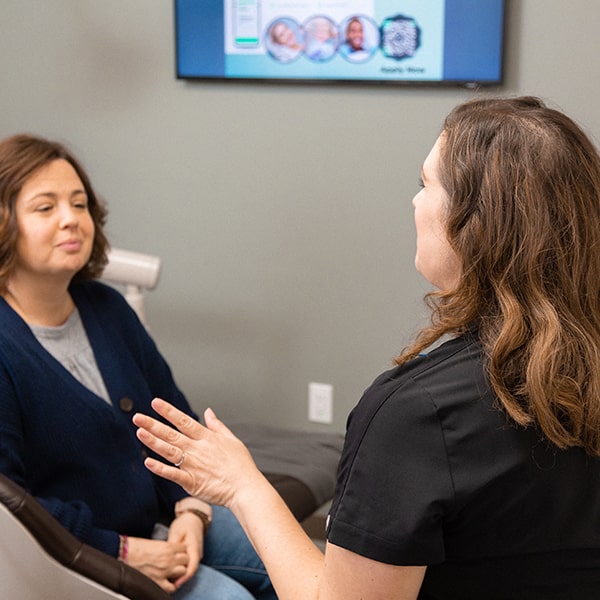BEST Emergency Dentist Near You
Trust our emergency dentist for prompt relief and expert treatment.
Same-Day Emergency Dentist Appointments Near You

Dental emergencies can be both uncomfortable and inconvenient. These situations often come with significant pain or swelling and typically force you to rearrange prior commitments like work, meetings, or school. Whether it’s a severe toothache, a broken tooth, or a sudden dental injury, dental emergencies tend to arise without warning, making them even more stressful.
When facing a dental emergency, one of the biggest concerns may be the cost of care, especially if you’re dealing with an emergency dentist cost without insurance. Emergency dental procedures such as fillings, extractions, or root canals can cost anywhere between $75 and $1,500, depending on the specific treatment required, such as a filling for a cracked tooth or a non-surgical extraction. Understanding these potential expenses ahead of time can help you plan for any urgent dental needs. At our practice, we are dedicated to making high-quality care accessible, which is why we offer a variety of payment options to ensure you can receive the treatment you need without added financial strain. From flexible financing to insurance assistance, we strive to accommodate a wide range of patients. Read on to learn more about emergency dental costs and how we can help manage your treatment.
Dental emergencies often arise at the most inconvenient times, whether it’s before a wedding, in the middle of the night, or while you’re on vacation. These unexpected situations might prompt you to search for urgent dental care nearby, sometimes outside of regular office hours. An untreated tooth infection or injury can lead to more serious health complications, which is why prompt care is essential. If you’re experiencing a dental emergency, don’t hesitate to contact us immediately! Our experienced team of emergency dentists in Stratford, CT, is ready to assist with any urgent needs. Whether it’s a lost filling, a broken tooth, or a severe toothache, we can provide relief quickly and effectively.
In some cases, a dental emergency may result in tooth loss, requiring a long-term solution. If a tooth is beyond saving, we offer dental implants as a durable and natural-looking option to replace it. Dental implants are designed to restore both the function and appearance of your smile, offering a permanent solution for missing teeth. Unlike dentures, dental implants are fixed in place, providing a comfortable and secure fit that feels just like your natural teeth.
We also offer affordable emergency dental care in Stratford and surrounding areas, including Trumbull, Bridgeport, Shelton, Milford, Orange, Woodbridge, Fairfield, and other nearby locations. Our clinic is committed to providing timely and compassionate care, whether you’re dealing with a routine issue or an urgent situation.
Additionally, we understand that dental emergencies can be overwhelming, which is why we prioritize patient comfort and clear communication. From the moment you call our office, our staff will work with you to ensure that you get the care you need as quickly as possible. We will help you navigate your treatment options and any concerns regarding cost or insurance coverage.
Contact our office today to schedule a same-day appointment for emergency dental services in Connecticut. If you have any questions about costs or available treatment options, don’t hesitate to call us. We’re here to help you get the care you need to restore your smile and overall well-being. Your dental health is our priority, and we’re committed to providing fast, affordable, and professional emergency care when you need it the most.
Contact our office today to schedule a same-day dentist appointment near you, including emergency dentist services in Connecticut, and feel free to call us with any cost questions you may have.
On This Page:
Types of Emergencies | What to Do | Emergency Root Canals | How Much Does An Emergency Dentist Cost | Things to Know | FAQ | Testimonials | Contact Us
What Type of Dental Emergencies Do We Handle?
-
Abscess/Infection
Teeth that have unfilled and untreated cavities may result in an infection and need for a root canal or extraction … Click to open this link in the same window … . Bacteria in the cavity can eventually reach the nerve and travel into the gums beneath, causing an abscess. Even old root canal … Click to open this link in the same window … teeth may form new infections if they get new cavities or have fillings/crowns that have come off. Food becomes lodged in the space, and the bacteria may form an infection in the root canal. If you’re experiencing a toothache and sore throat on one side, it could be a sign of an infection spreading, and prompt treatment is important.
-
Avulsed (Lost) Tooth
An avulsed tooth is a tooth that has been knocked out due to trauma. The most common cause of an avulsed tooth is a sports-related injury. If an adult tooth has been knocked out, it’s important to see us immediately.
You may pick up the tooth by the crown (the part that sticks out of the gums). Do not touch the root. If you are able to put the tooth back into the socket or try holding it under your tongue until you can get to our office. You can also place the tooth in milk, saline, or saliva in a cup. If a tooth cannot be saved, we will discuss replacement options. Some options include a dental bridge … Click to open this link in the same window … or dental implants in CT … Click to open this link in the same window … .
-
Broken/Cracked Tooth
When teeth have cracks, are broken, or are chipped, they may not be painful right away. If the dentin (the layer below the enamel) is exposed, it may elicit pain when you have hot or cold food and drink. A cracked tooth can deepen over time until it reaches the nerve, resulting in pain and the need for a root canal or extraction. Broken teeth with exposed dentin could be more susceptible to cavities, and existing cavities could result in infection. That is why it’s essential to seek cracked tooth repair near you as soon as you notice your tooth is cracked or chipped.
-
Children’s Emergencies
From the time their first tooth grows in, children are not immune to dental emergencies. Broken or chipped teeth, cuts, bruises, and loose teeth can all occur with children of any age. Unfilled cavities may also lead to pain. Children start losing their teeth as early as age four and may continue to do so until even 16 years old.
Damaged teeth that may not fall out for years may continue to decay, causing pain or an abscess. Occasionally, an infected baby tooth can even damage the developing adult tooth beneath it. Additionally, any tooth that needs to be pulled prematurely will create a cascade effect that almost certainly will create a need for orthodontics (braces). It’s important to have your child regularly visit a pediatric dentist … Click to open this link in the same window … for examinations and cleanings.
-
Gum Emergencies
Gum pain can arise from many sources. Sores, cuts, gum disease and food can all trigger pain in your gums. Sores or cuts are not only painful but can become infected. It’s best to have them evaluated, and in some cases, medication can be prescribed to help them heal.
Gum disease … Click to open this link in the same window … , if present, can cause the gums to be swollen and tender. They may bleed or make chewing food and brushing teeth uncomfortable. At your dental checkups, we screen and examine your gums to ensure that any changes or diseases noticed are addressed immediately.
Occasionally food may get stuck in your gums; if left, the gum can swell, and an infection forms. If regular flossing cannot dislodge it, it’s best to have it cleaned out by our office. Any area that continually traps food is at risk for a cavity or gum disease, so it’s best to determine how to fix the problem area.
-
Sharp Tooth
A broken or chipped tooth may cause pain from irritation. Biting your cheek, tongue or lip can become painful as you continue to re- bite the cut areas. It may make it difficult to eat or speak if the irritation gets very swollen. If a small chip is creating a sharp edge, a simple smoothing down of the chip will prevent you from continuing to bite yourself. If it’s a larger break in the tooth, a filling or crown may be needed to prevent more breakage. Always have any broken or chipped teeth checked to make sure they will not do any more damage or cause any pain.
-
Temporomandibular Joint (TMJ)
The temporomandibular joint refers to the joint that holds the lower jaw (mandible) to the skull. Pain, clicking, or other symptoms associated with the TMJ are referred to as Temporomandibular disorder (TMD) … Click to open this link in the same window … . TMJ can cause muscle spasms, headaches, or a jaw getting “locked” open. This can be due to problems with your bite, jaw discrepancies, clenching, or grinding your teeth could all lead to joint or muscle problems.
At your dental visits, we can evaluate your TMJ for signs of “clicking” called crepitus that may indicate a problem with the joint. In early, mild cases, a customized mouth guard or splint can be fabricated to relax your jaw, balance your bite, and place less stress on the joint. In some cases, muscle relaxers or pain medication may be needed to relieve symptoms. In more advanced or painful situations, a referral to a TMJ specialist is needed.
-
Unfilled Cavities
Cavities start in the outer layer of the teeth, called the enamel. Over time, the cavities grow and get deeper and deeper into the teeth. They infiltrate the enamel and get into the deeper dentin layer until they eventually reach the nerve or pulp of the tooth.
Oftentimes, you do not know cavities are present when they are small. It’s only as the cavities infiltrate and get deeper into the tooth that you may begin experiencing sensitivity or pain. Once the cavity reaches the nerve, a root canal will be the only thing to save the tooth and relieve pain. It’s important to have regular check-ins with our office to determine if any cavities are present. If treatment (a filling … Click to open this link in the same window … ) is needed, it’s best to have it done as soon as the cavity is found.
What You Can Do until You Get to an Urgent Dental Care near You or Your Local Dentist
-
If you lose a permanent tooth, pick it up by the crown, not the root. If you can, place it back in the hole and get to a local dentist near you in Stratford, CT, immediately.
-
Over the counter, temporary cement may be used to place the crown over the sensitive tooth until you can see your dentist.
-
Over-the-counter pain relievers can be used to help dull the pain until your dental emergency appointment.
-
Your dentist may be able to call in a prescription antibiotic or pain reliever to the pharmacy if you are away from home.

Emergency Root Canals
Tooth pain and infection can be excruciating, making it challenging to eat, speak, or carry out even the most straightforward tasks. In some cases, the only way to regain oral health and get rid of severe pain is through a root canal procedure. Although the prospect of getting a root canal may be daunting, it’s a common and effective treatment for tooth pain and infection.
At Hawley Lane Dental in Stratford, CT, we understand the severity of the need for a root canal procedure and offer multiple services, including emergency root canals, tailored to our client’s needs. As your root canal specialist near you, we provide a comfortable and relaxing atmosphere to ensure that our patients feel at ease during the entire procedure.
What Is A Root Canal & How Do I Know I Need One?
When the pulp or nerve tissue inside a tooth becomes inflamed or infected, it can lead to severe pain and discomfort. A root canal is a common dental procedure that involves removing the inner nerve of the tooth to relieve pain and infection. During the procedure, a local anesthetic is administered, and a rubber dam is placed over the tooth to protect it. Any cavity and infected nerve tissue are then removed, and the inside of the tooth is shaped with specialized files. The space inside the tooth is then filled with a dental material, such as gutta-percha, and a temporary filling is used to seal the tooth.
Symptoms that may indicate the need for a root canal include:
- Persistent pain
- Sensitivity to heat and cold
- Tooth discoloration
- Swollen gums
- Pain when eating or touching the tooth
- A chipped or cracked tooth
- Tooth mobility
Your Trusted Emergency Dentist in Connecticut – Emergency Root Canal Near You
If you’re experiencing unbearable tooth pain, Hawley Lane Dental understands that you need immediate relief. In some cases, an emergency root canal may be required to alleviate the pain and prevent further damage to the tooth. During this procedure, the dentist will assess the situation and decide if the tooth needs to be immediately extracted, or if a pulpotomy, which involves removing the pulp nerve, is necessary. The main aim is to provide immediate relief from pain, but you’ll need to return for a second appointment to finish the canal shaping and filling, as well as placing a crown over the tooth.
Our team of skilled professionals has the expertise to handle any dental emergency, ensuring that you remain comfortable throughout the process. We proudly serve patients from Trumbull, Bridgeport, Shelton, and Milford, offering prompt and compassionate care when you need it most. Don’t put up with the agony any longer—contact Hawley Lane Dental today if you are in need of a same-day root canal by an emergency dentist near me in Stratford, CT.
Connecticut Emergency Dentist Root Canal & Tooth Extraction Cost: Understanding Emergency Dentist Cost Without Insurance
At Hawley Lane Dental, we recognize the importance of emergency root canal procedures in providing immediate relief from severe tooth pain and preventing further dental complications. However, we understand that the cost of such procedures is a concern for many individuals. That’s why we strive to make emergency root canal services affordable for our patients.
Typically, the cost of a root canal procedure ranges from $1200-$1500, and emergency visits can add an additional cost of around $200. If you require an emergency filling as part of a cracked tooth repair or other minor damage, the cost typically ranges between $100 and $250. We believe that everyone deserves access to quality dental care, which is why we offer various payment options, including financing plans and insurance coverage, to ensure that our patients receive the necessary care without facing financial constraints. So, if you’re experiencing tooth pain and require emergency dental services, don’t let cost be a barrier to obtaining the treatment you need.
For a non-surgical extraction of a tooth that has emerged through the gum, the cost ranges from $75 to $300. If the tooth is impacted or requires anesthesia for other reasons, the cost ranges from $200 to $600. Recovery typically takes 2 to 3 days, and removing a severely decayed tooth is often advantageous for patients.
Contact Hawley Lane Dental to discuss your options, including understanding the emergency dentist cost without insurance, and receive the care you require to restore your oral health.
What You Need to Know before You Go to Your Family Dentist
Save yourself time and additional worry when facing a dental emergency.

In most dental emergency situations, it’s essential not to ignore your pain or symptoms. Trying to treat your condition at home can lead to worsening over time. Never try to take antibiotics that have been “leftover” from other prescriptions and never take medication that was not prescribed to you.
We are here for you! We understand how important it is to address tooth emergencies quickly, so we want to be your #1 choice for an affordable emergency dentist near you. Call our office. … click to call … Even if we are closed, there is a way to reach us through an after-hours number.
Even though emergencies can sometimes pop up with no prior warning or previous problems, most cases can be avoided. Regular exams and cleanings will help keep you healthy and reveal if there are any potential problems. Having any condition addressed immediately can keep you comfortable and avoid any painful emergencies. Call our office in Stratford, CT, today to schedule your regular check-up and learn about our emergency dentist services in Connecticut, ensuring prompt care near you.
For those seeking a dentist in Milford, Trumbull, Bridgeport, or Shelton, Hawley Lane Dental offers emergency dental care conveniently located just minutes from Milford.
Emergency Dentist FAQ
Our expert dentist guides you to better health.
-
Can the Emergency Room Pull a Tooth or Should I Seek Urgent Dental Care near Me?
Unless your hospital has an oral surgeon on staff (and most don’t), they will not be able to pull a tooth. Most emergency rooms will assess for infection and provide you with a painkiller and antibiotic if necessary. Your best bet is to seek an affordable walk-in dentist near you. If you’re in Trumbull, Bridgeport, Shelton, or Milford, Hawley Lane Dental offers emergency dental care to provide the treatment you need as soon as possible.
-
How Long Should a Tooth Extraction Hurt?
Following a tooth extraction, it is normal to feel some discomfort 24-48 hours after your visit. Severe pain, pain not alleviated by pain killers or pain lingering beyond 48 hours may indicate a dry socket or infection. If you experience any of the above symptoms or are worried about any pain you are feeling, a call to your dentist is necessary. If you need help after a tooth extraction near you, our team is ready to support your smooth recovery.
-
Can I Drink Water after an Extraction?
It is important to stay hydrated after surgery, so drinking water is allowed and necessary. Room-temperature water is best and you should refrain from using a straw. Suction in the mouth (as with from a straw) can cause a dry socket. A dry socket is not only painful but also requires further treatment by your dentist.
-
Can a Broken Tooth Be Saved?
The extent of the break will determine if a tooth can be saved. Generally speaking, if the break is above the gum line, there is a good chance the tooth can be saved. If this is the case, a root canal and/or crown may be necessary to save the tooth. During your examination, we will also discuss with you the porcelain crown cost … Click to open this link in the same window … vs other options, in addition to a root canal or extraction. If there is any break below the gum, the tooth may not be salvageable and require extraction. Teeth that begin with small chips may break further, so it’s best to see your dentist initially to give your teeth the best chance to be fixed.
-
What Is Considered a Dental Emergency?
Any situation that involves pain or swelling is a dental emergency. Most dental offices have emergency numbers if the situation happens after hours. Additionally, searching Google for “emergency dentist near me ” or “urgent dental care near me” emergency rooms may be able to see you to assess the emergency. Facial swelling with or without fever, difficulty swallowing, or lethargy may all be signs of life-threatening emergencies and should be addressed immediately. If you’re in Connecticut, our emergency dentist services are available to provide prompt care near you.
-
What Is the Best Painkiller for a Tooth Extraction?
If you take any medications, you should discuss with your dentist the best painkiller to take following your extraction. Some health conditions or medications may cause side effects of even over-the-counter painkillers. If you are generally in good health, it’s best to start with an over-the-counter painkiller. A good rule of thumb is to take whatever you would take for a headache. Any pain that cannot be resolved with painkillers or lasts beyond 48 hours should be assessed by your dentist.
Contact Hawley Lane Dental In Stratford, CT
Schedule an emergency dentist near you for all types of dental emergencies!
If you’re in excruciating tooth pain, facing a dental emergency, or just looking for an affordable walk-in dentist near you, contact Hawley Lane Dental right away for immediate assistance. Our team of experienced & affordable emergency dentists near you understands the urgency of your situation and is ready to provide necessary services, including emergency root canals, to alleviate your discomfort and restore your oral health. We provide affordable and accessible dental care, and our various payment options, such as financing plans and insurance coverage, ensure that cost will not be an issue. Don’t suffer any longer; contact us now to schedule an emergency dentist appointment and get the necessary care.
If you need an affordable emergency dentist near Bridgeport or a family dentist near Trumbull, contact our team at Hawley Lane Dental, we’re here to provide prompt and reliable care.
-
Monday - 9:00am–5:00pm
-
Tuesday - 8:00am–5:00pm
-
Wednesday - 8:00am–5:00pm
-
Thursday - 8:00am–5:00pm
-
Friday - 8:00am–5:00pm



